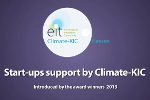Transition to Zero Emission Bus Transportation (ZEB)
Challenge Platform: Sustainable City Systems
Project Start Date: 07/2013
Lead partner: Delft University of Technology (TU Delft), NL
Project type: Pathfinder – Explores relevant climate arenas to identify and prioritise innovation opportunities
Project lead: Michiel Ytsma (TU Delft) <m.m.ytsma@tudelft.nl>, Jan Willem de Kleuver, Twynstra Gudde <jwk@tg.nl>
Partners
The ZEB project involves 6 partners:
- Delft University of Technology (TU Delft), NL (Climate-KIC Core Partner)
- Twynstra Gudde, NL
- Province Utrecht, NL
- Schiphol Airport, NL
- Energy Technology Institute, UK
- Institute for Sustainability, UK
Concept
As the air quality in urban areas gets increasingly worse through CO2 emissions and other
pollutants, zero emissions bus systems provide an important way to improve this worsening
situation. But without enough reliable data, the move towards electric bus fleets across
Europe is proving to be a slow process.
The Climate Change Issue
Fossil-fuelled bus transport systems are a major source of CO2 emissions. Every single day diesel powered buses drive millions of kilometres throughout the European Union using inefficient internal combustion engines. There are no doubts in the ability of zero emissions bus transport systems to improve the air quality in urban areas. Especially when it’s considered that an electric bus can save 500 tonnes of CO2 being released every year compared to a bus running on diesel. But without enough reliable data on the costs and benefits of running an electric bus fleet, implementation into the market is proving to be a difficult process.
The Project Solution
The Decision Support Model for transition to Zero Emissions Bus (ZEB) project is bridging the gap between technology and information in the decision-making process. By designing a standardisation decision support model, the project will help to move forward the transition towards zero emission bus transportation. Based on a Total Cost of Ownership (TCO) approach, the model will demonstrate the higher purchase price for zero carbon buses against the potential for long-term benefits. Through better insight into the TCO of zero emissions buses and supporting infrastructure, the project is focused on making the benefits and disadvantages of zero emissions bus transport clearer to better inform decisions. The end goal is to develop the design of a standardised decision support tool, with the long-term aim to accelerate the transition to low carbon transportation across Europe.
The Role of Climate-KIC
By working with Climate-KIC, the project has received the funding required to advance and gain access to new partners who have helped to deliver a Europe-wide perspective. This includes working with partners in the UK, the Netherlands and Spain such as the Institute for Sustainability, Schiphol Airport and the Instituto Tecnológico de la Energía. Meaning the project has now been able to assess how zero emissions buses would work in relation to the different systems in different countries and develop a European approved model.



